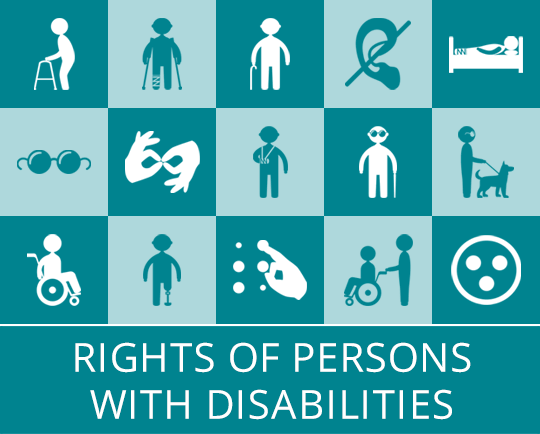This article is written by Pranit Kotiyan who is pursuing a Certificate Course in Introduction to Legal Drafting: Contracts, Petitions, Opinions & Articles from Lawsikho.
“My disability exists not because I use a wheelchair, but because the broader environment isn’t accessible.” – Stella Young
Table of Contents
Introduction
Did you know nearly 2.21% (2.68cr people) of the Indian population is disabled in various types of disabilities?. 1.5crore are males and 1.18 crores are females, while the majority is in rural areas that is 69%. In order to protect them from alienation, the (Equal Rights, Protection of Rights and Full Participation Act) came into force in 1996 this Act covered only 7 types of disability as it was seen it was lacking short of today’s realities the new act tries to cover it. This article will talk about the Rights of People with Disabilities Act 2016.
Definition of Disability
According to WHO (World Health Organization), “Disability results from the interaction between individuals with a health condition such as cerebral palsy, Down syndrome and depression as well as personal and environmental factors including negative attitudes, inaccessible transportation and public buildings, and limited social support”.
The Right to Persons with Disability Act came into force on 19th April 2017 to give an effect to the United Nations Conventions on Rights with Persons with Disability.
The disabled, specially-abled, handicapped or Divyangjan are the most vulnerable section of this capitalist society due to many factors such as poor education, lack of family support, lack of representation, low social security and health benefits etc.
In the context of India as nation characters(Dhritarāstra, Gāndhārī, Astavakra, Mantharā) with disability in Hindu mythology lack richness and are usually pigeon-holed to categories of human qualities that deepens the sense of ‘othering’, though the qualities are (overly) positive like the utilization of ‘divyang’ to ask a person with a disability (PWD). Because the epics function as both religious scriptures and an upscale source of philosophy and morality, the symbols of disabled identity it creates, cause institutional practices of stigmatization, exclusion, marginalization even today within the 21st century.
Analysis of the Right to Persons with Disabilities Act, 2016
Analysis: Prior to the Persons with Disabilities Act 2016 the laws governing the disabled were scattered in the Constitution of India.
-
Definition
The Right to Persons with Disabilities Act (RPWD Act 2016) has categorized Person with disability into three:
- Person with benchmark disability
- Person with disability
- People with disabilities having high support needs.
In the RPWD Act 2016, there has been an increase in the type of disabled, which has been increased from 7 types to 21 types and the Central Government has the power to add more maladies.
-
Types of disability are as per RPWD Act 2016-
- Blindness
- Low-vision
- Leprosy Cured persons
- Hearing Impairment (deaf and hard of hearing)
- Locomotor Disability
- Dwarfism
- Intellectual Disability
- Mental Illness
- Autism Spectrum Disorder
- Cerebral Palsy
- Muscular Dystrophy Chronic
- Neurological conditions
- Specific Learning Disabilities
- Multiple Sclerosis
- Speech and Language disability
- Thalassemia
- Haemophilia
- Sickle Cell disease
- Multiple Disabilities including deafblindness
- Acid Attack victim
- Parkinson’s disease.
-
Rights and entitlement
This Act provides that “the appropriate Government shall make sure that the person with a disability (PWD) enjoys the proper to equality, life with dignity, and respect for his or her own integrity equally with others.”
-
Equality and non-discrimination
The governmental authorities are to require steps to utilize the capacity of the PWD by providing an appropriate environment.
It’s additionally stipulated within section 3 that no PWD shall be discriminated on the idea of disability unless it’s shown that the impugned act or omission could also be a proportionate means of achieving a legitimate aim and no-one shall be deprived of his personal liberty only on the idea of disability.
Living within the community for PWD is to be ensured and steps are to be taken by the govt. to form sure reasonable accommodation for them.
-
Women and children with disabilities
Special measures are to be taken to make sure women and kids with disabilities enjoy rights equally with others.
-
Protection from cruelty and inhuman treatment
Measures are to be taken to guard the PWD against being subjected to cruelty, inhuman, and degrading treatments and from all sorts of abuse, violence, and exploitation.
For conducting any research, free and consent from the PWD also as previous permission from a Committee for Research on Disability to be constituted within the prescribed manner.
-
Protection from abuse, violence and exploitation.
Under section 7(2) of the Act, an individual or registered organization, who or which has reason to believe that an act of abuse, violence, or exploitation has been committed or it is being or shall commit in future against any person with Disability, may give information to the local Executive Magistrate who shall take immediate steps to stop or prevent its occurrence and pass appropriate order to protect the PWD.
Police officers, who receive a complaint or otherwise come to know of violence, abuse, or exploitation, shall inform the aggrieved PWD of his right to approach the chief Magistrate.
The policeman must also inform about particulars of the nearest organization such as an NGO working for the rehabilitation and development of the Person with Disability, right to free legal aid, and right to file a complaint under the provisions of this Act or the other law handling such offence.
-
Reproductive rights
The onus is put on the Government to protect the Reproduction Rights of Persons with Disability also making them aware of family planning.
-
Education
The education institutions which are funded by the Government or Local authorities should admit them without discrimination, make educational institutes more accessible, by providing infrastructure, transportation, different modes of communication, to train teachers to deal with special kids, to provide books free of cost to people with benchmark disability up to the age of 18 years, to provide scholarships and shall ensure promotion and participation of PWD’s equally.
Sec 31 of the Act declares that a child with benchmark disability aged between 6 – 18 shall have the Rights to free education in a special school, neighbourhood school or any school of his choice.
-
Reservation and Employment
Reservation not less than 3% should be provided in higher educational institutes, government jobs, Persons with Benchmark Disability have provided benefits in the allocation of land, poverty alleviation schemes etc. Provision for grievance redressal officer is also being provided. The government must notify posts only reserved for Persons with Benchmark Disability.
Very Interestingly this time the private sector has also been targeted and a set of rules have been set up such as:
- Frame an Equal Opportunity Policy.
- Appoint a Liaison Office.
- Identify Posts / Vacancies for Disabled people – Not Mandatory
(When a private institute receives funding from Respective Government they need to ensure their 5% of employees are PWD’s. - Prohibit Discrimination.
- Provide Additional benefits / Facilities
- Revamp existing hiring policies
- Confirm with accessibility norms
- Maintenance of Record.
-
Authority
Monitoring implementation of the Act will be looked The Chief Commissioner for Persons with Disabilities and the State Commissioners also will act as regulatory body and Grievance Redressal agencies for the speedy remedies.
-
Funds
A fund will be created to provide financial support to people with disabilities both at the state and national level
-
Courts:
For handling of cases concerning with violation of Rights of People with Disabilities. And for ensuring speedy trials, special courts are to be constituted in each district.
-
Penalty
Breach of the provisions of the Act are penalised by a fine of an amount up to Rs.10,000/- (Ten thousand only) and Rs .50,000/- (fifty thousand only) with could be extended up to 500000/- (5 lakhs only) for further Breach.
Cruelty on Person with Disability (PWD) is made punishable with imprisonment of 6 months extendable to five years and with a fine. Spuriously availing the advantages which are created for Person with Disability (PWD) has also been made punishable.
Case Law
Vikash Kumar Vs Union Public Service Commission and Ors.
The case of Vikash Kumar Vs Union Public Service Commission and Ors, recognizes and amplifies the proper to reasonable accommodation and roots it within the constitution. Its reflective of the metamorphosis of the disability rights jurisprudence of India, which is why it’s imperative to debate its implications and therefore the gaps that are yet to be filled.
Decided on 11.2.2021
Brief Facts:
- The Appellant had a disability known as Writers Cramp. He was a UPSC CSE aspirant The Respondent-Commission issued notification for the CSE.
- The Department of Personnel and Training issued the CSE Rules 2018 providing for the manner and conduct of the examination.
- The general instructions provided that all candidates must write their papers in their own hand and will not be allowed the help of a scribe.
- Exceptions to this Rule were provided for blind candidates. The candidates with locomotor disability and cerebral palsy where the dominant (writing) was impacted to the extent of slowing the performance of function (40 % minimum impairment).
- Candidates within the exception were allowed the help of a scribe. In his online application for the CSE 2018, the Appellant declared himself to be an individual with a benchmark disability of forty per cent or more. By his email, the Appellant requested the Commission to produce him with a scribe for the examination.
- The Respondent-Commissioner rejected the request on the turf that a scribe might be provided only to candidates with locomotor or blind category or spastic paralysis with an impairment of a minimum of forty per cent and therefore the Appellant didn’t meet this criterion. Aggrieved by the denial of the services of a scribe for the CSE 2018, the Appellant moved the Tribunal.
- The Tribunal dismissed the appliance filed by the Appellant on the ground that, since Hospital had refused to issue a disability certificate, the Appellant couldn’t claim access to ascribe as a disabled candidate.
- The Appellant instituted a writ petition before the supreme court of Delhi and challenged the legality of the CSE Rules 2018. Meanwhile, he obtained a medical certificate from the National Institute of mental health and Neuro Sciences (NIMHANS), declaring that he had a writer’s cramp and would require a scribe during his examinations.
- A Division Bench of the supreme court of Delhi by an order declined to interfere with the order of the Tribunal on the bottom that the Appellant had not qualified at the preliminary exam for CSE 2018 and thus, the relief seeking an amendment of the CSE Rules 2018 to supply scribes to candidates with specific disabilities was rendered otiose.
Questions of Law
- Whether Appellant would be entitled to the facility of scribe for appearing at Civil Services Examination and any other competitive selection conducted under the authority of government?
- Whether the Appellant suffers the benchmark disability within the meaning of Sec 2(r) or Sec 2(zc) of the RPWD Act 2016?
- Whether he is a person with a disability within the meaning Sec 2(s) of the RPWD Act 2016?
Observations of the Court:
- “To deny the facility of a scribe in a situation such as the present would negate the valuable rights and entitlements which are recognised by the RPWD Act 2016.”
- The court opined that “DoPT and UPSC have fundamentally erred in the construction which has been placed on the provisions of the RPwD Act 2016. To confines, the facility of a scribe only to those who have benchmark disabilities would be to deprive a class of persons of their statutorily recognized entitlements.
To do so would be contrary to the plain terms as well as the object of the statute.” The Supreme court not only wants to extend the scribes for people with benchmark disabilities but for other disability as well. - The court also observed that the guidelines released by the Ministry of Social Justice and empowerment on 29th August 2018, the nodal ministry entrusted for implementing the provisions of RPWD Act 2016 has recognized that these guidelines are not exhaustive of the circumstances or conditions in which ascribe can be provided.
On the contrary, the MSJE has recognized the prevalence of other medical conditions “not identified as disabilities per se” but which may hamper the writing capability of a person. It specifically leaves it open to every examining body to consider such cases for the grant of the scribe, extra time or other facilities in consultation with the Ministry of Health and Family Welfare against the production of a medical certificate, in line with those prescribed for candidates with benchmark disabilities.
Conclusion of the case
Benchmark disability, not a precondition to obtaining a scribe.
This a welcome move by the judiciary as prestigious exams such as civil services hold great importance for students especially for students with a disability as a representation of such students is very low due to high competition, Disability is a Disability that hinders your normal functioning and that should be acknowledged duly by the authorities.
Here we see Justice D Y Chandrachud has shown so much empathy towards the specially-abled people is just overwhelming, the whole judgement has so many paras where the pure intention and depth of wisdom of the court to support and do justice to the weaker section of the society defines why it is called the Supreme Court.
I especially recommend this case to each one of you to read and think about whether we are really sensitive about these issues or just on social media to look sensitive.
Government Schemes / Initiatives for the Disabled
Government Schemes / Initiatives for the Disabled:
- Accessible India Campaign
- Deendayal disability rehabilitation scheme
- National fellowship for students with disability
- Scheme of Assistance to Disabled Persons for Purchase/Fitting of Aids and Appliances (ADIP Scheme)
- UDID – Unique Disability ID
Challenges
The challenges are as follows:
- To lessen the institutional hindrances as there is lack of awareness amongst masses, lack of care and accessibility, not having good enough medical and rehabilitation facilities.
- Although we see there are schemes and initiatives launched by the governments but there is a lack of implementation and the process is very slow.
- The taboo relating to Disability is still very much prevalent in India, people treat them as an object of pity and sympathy and treat them as third-class citizens and considers them as a liability which makes the disabled vulnerable to discrimination harassment, bullying, mental torture and isolating
- The education system and infrastructure in India lack inclusivity which a fundamental problem as there is a shortage of special schools, trained teachers and proper funds for the same.
- Employment is a challenge as other than Government jobs which have a reservation, the employment is otherwise very low, even though in cases where the person is capable enough.
- No proper data of different types of disability.
Way forward
- Societal Awareness about disability and people with disability through awareness campaigns and sharing of stories of people with disability who are successful in life so that people with disability are better integrated into society.
- The education system must be made robust for PWD’s by building more special schools, train teachers accordingly and have accessible infrastructure and study material.
- The private sector should and must be legally bound to create a specific number of posts for People with disability and necessary skills should be provided by the Government.
- Indian Government should focus on building projects that are roads, malls, stations etc disabled friendly and current establishments should have a revamp.
- There should proper scrutiny and tracking of allocated funds and in the coming years, the government should think about increasing the allocation of funds for the welfare of the disabled.
- Lack of Representation in Parliament and respective State Assemblies should be worked on by both states and central Government.
LawSikho has created a telegram group for exchanging legal knowledge, referrals, and various opportunities. You can click on this link and join:
https://t.me/joinchat/J_0YrBa4IBSHdpuTfQO_sA
Follow us on Instagram and subscribe to our YouTube channel for more amazing legal content.
 Serato DJ Crack 2025Serato DJ PRO Crack
Serato DJ Crack 2025Serato DJ PRO Crack











 Allow notifications
Allow notifications


